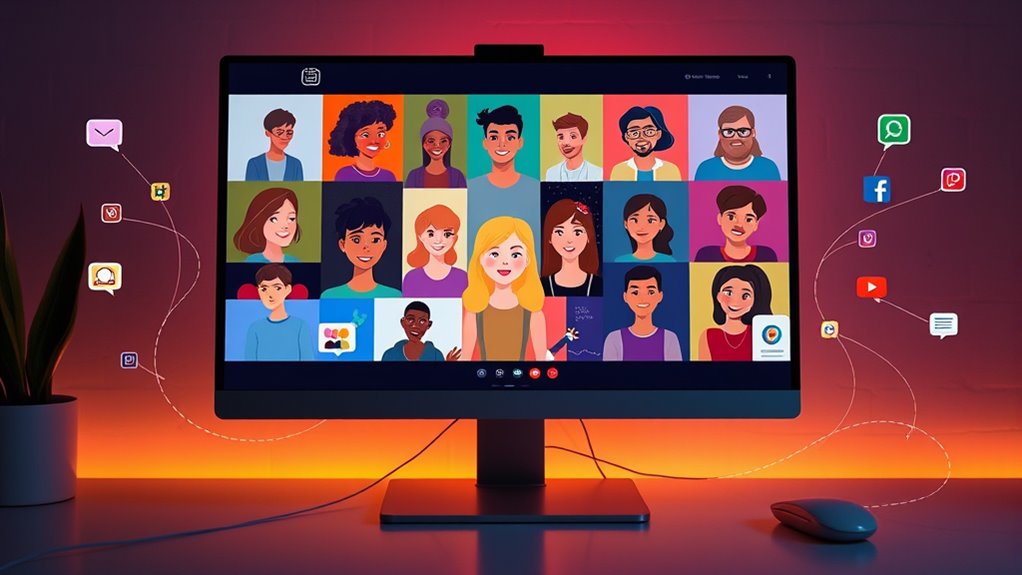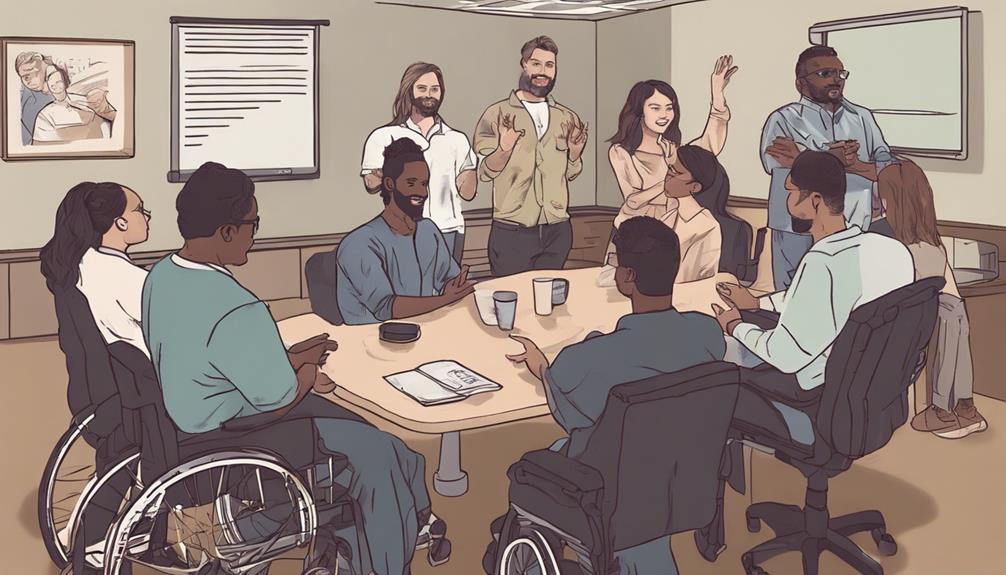Building your online support network starts by finding communities that match your needs, such as groups on Reddit, Facebook, or specialized forums focused on anxiety, depression, or trauma. Be honest about your journey and listen to others with kindness and respect. Participate regularly to form stronger bonds, try virtual meetups, and set boundaries to guarantee safe spaces. Keep exploring different groups until you find those that truly uplift you—there’s more to discover on this path.
Key Takeaways
- Identify mental health communities aligned with your needs on platforms like Reddit, Facebook, or specialized forums.
- Engage actively by sharing your experiences and listening to others with kindness and respect.
- Explore different groups to find safe, supportive spaces that resonate with your personal journey.
- Participate in virtual meetups and live chats to deepen connections and foster trust within your support network.
- Remember that online support networks complement professional help and are essential for ongoing emotional resilience.

Have you ever wondered how to find support when you need it most? In today’s digital age, building a support network online has become more accessible and essential than ever. The internet offers a wealth of resources, especially through mental health communities and peer support groups, where you can connect with others who truly understand what you’re going through. These online spaces provide a safe haven to share your experiences, seek advice, and find encouragement without the fear of judgment. When you’re feeling isolated or overwhelmed, knowing that you’re not alone can make a big difference, and these communities are designed to foster that sense of belonging.
Getting started is often as simple as searching for mental health communities that align with your needs. Platforms like Reddit, Facebook, and specialized forums host groups dedicated to various issues such as anxiety, depression, grief, or trauma. Participating in these groups allows you to exchange stories, ask questions, and receive support from people who have faced similar struggles. Peer support groups, in particular, emphasize shared experiences and mutual understanding. They’re often led by trained facilitators or members who have firsthand experience, making the environment more relatable and trustworthy. Engaging regularly in these groups helps build connections that can extend beyond the online realm, offering ongoing support and friendship.
Join online mental health and peer groups to share experiences and find support from those who truly understand.
Building your support network online also involves being proactive and authentic. Share your journey honestly, and be open to listening to others. Remember, these communities thrive on mutual respect and empathy, so approach interactions with kindness. As you participate more, you’ll start to recognize familiar faces, which can lead to deeper connections. Over time, some members may become your go-to for advice or just a friendly chat when things get tough. You can also look for virtual meetups or live chats within these communities to deepen your involvement and create a more personal bond.
It’s important to set boundaries and prioritize your well-being. Not every group will feel right for you, and that’s okay. Take your time exploring different mental health communities and peer support groups until you find spaces where you feel safe and understood. Remember, online support networks are there to supplement professional help, not replace it. They’re a valuable tool to remind you that you’re not alone in your journey, and with patience, you’ll find your tribe—people who uplift, support, and validate your experiences every step of the way. Additionally, understanding the importance of market research can help you identify which communities resonate most with your needs, making your support network even more effective.
Frequently Asked Questions
How Do I Identify Genuine Supportive Communities Online?
To identify genuine supportive communities online, focus on community engagement and authenticity indicators. Look for active participation, respectful interactions, and members sharing helpful insights. Trust your instincts—if conversations feel sincere and welcoming, it’s a good sign. Avoid communities with excessive self-promotion or negativity. By observing how members engage and the overall tone, you’ll spot authentic spaces where you can truly connect and grow.
What Are Some Signs of Toxic Online Support Groups?
When you’re in an online support group, watch for signs of toxicity. Negative interactions, such as constant criticism or dismissiveness, signal unhealthy dynamics. If members make you feel judged or uncomfortable, that’s a red flag. Also, be wary if the group promotes gossip or discourages positivity. Healthy communities foster respect and understanding, so trust your instincts and step away if you notice persistent negativity or toxic behaviors.
How Can I Maintain Privacy While Building an Online Support Network?
Think of your online presence as a delicate garden. To keep it safe, you need privacy tips that protect your space. Use strong, unique passwords, avoid sharing personal details, and enable two-factor authentication. For online anonymity, consider using pseudonyms and VPNs. These steps guarantee your support network remains secure, allowing you to connect authentically without risking exposure. Your digital garden flourishes best with careful, intentional boundaries.
What Platforms Are Best for Connecting With Like-Minded Individuals?
To connect with like-minded individuals, you should explore social media platforms like Facebook, Twitter, and Instagram, which offer groups and communities tailored to your interests. Online forums also provide a safe space for deeper conversations and support. Choose platforms that prioritize privacy settings, and always review community guidelines to guarantee a respectful environment. Engaging actively and consistently helps you build genuine connections with people who share your passions.
How Do I Handle Disagreements Within My Online Support Community?
Imagine a calm pond after a storm—peace restored. When disagreements arise in your online community, approach conflict resolution with patience and empathy. Set clear boundaries to protect your space and promote respectful dialogue. Remember, you’re the anchor; guiding conversations gently helps foster understanding. Handle conflicts with honesty and kindness, turning storms into opportunities for growth. Through setting boundaries and practicing conflict resolution, you’ll nurture a supportive, harmonious online environment.
Conclusion
As you stumble upon that unexpected online community, it feels like a coincidence, but really, it’s the universe guiding you to your tribe. Building a support network isn’t about luck; it’s about staying open to connections that resonate. Sometimes, the right group appears just when you need it most—proof that, even in digital spaces, meaningful relationships find their way to you. Trust these moments; they’re the threads weaving your support system together.










